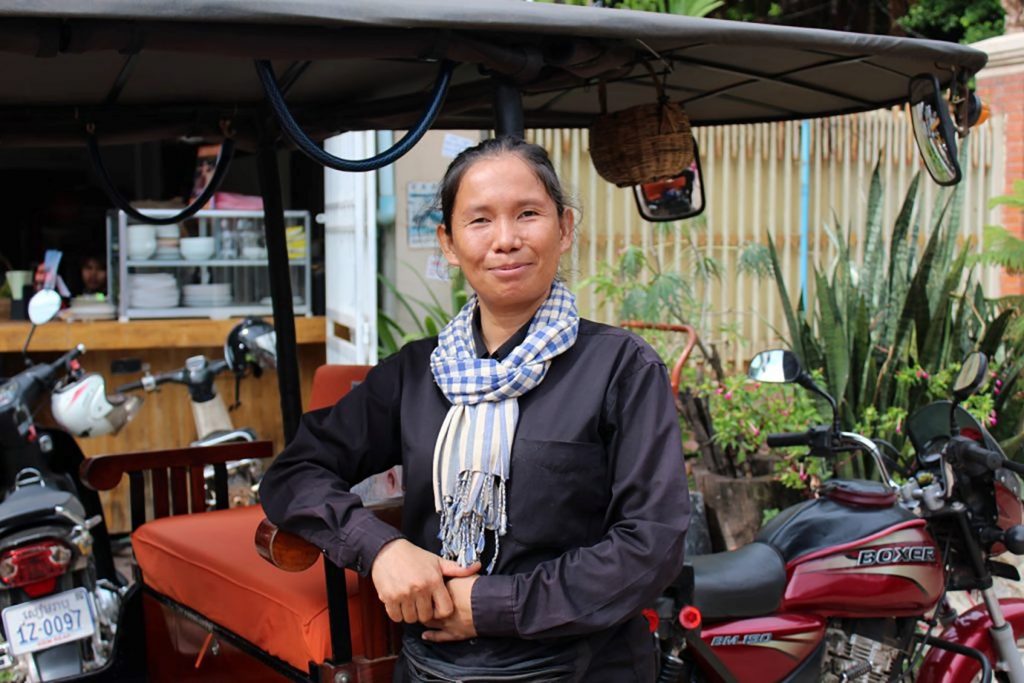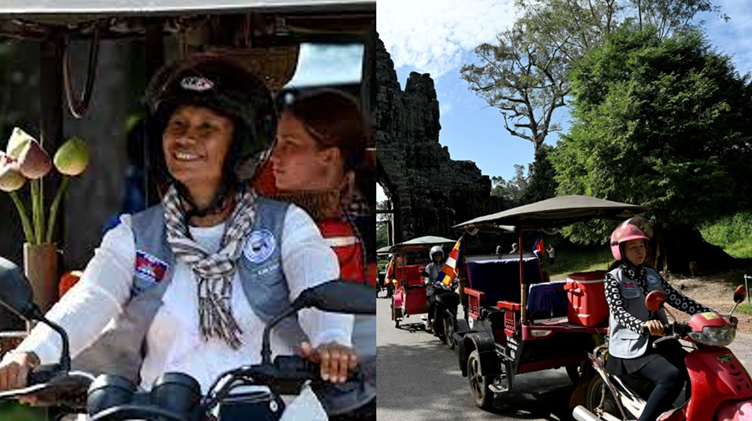In Cambodia’s bustling tourist hubs of Siem Reap and Phnom Penh, a quiet yet transformative revolution is unfolding. Brave women like Roeung Sorphy, Kim Sokleang, and Sieng Meng are boldly challenging stereotypes and defying societal expectations as they step into the male-dominated world of tuk-tuk driving in Cambodia. Their stories shine a spotlight on the ongoing struggle for gender equality, capturing the attention of both travellers and locals at a time when women’s working rights are under scrutiny by NGOs and the global community.
Despite Cambodia’s progress towards gender equality, deeply ingrained conservative traditions often confine women to household roles rather than paid employment. According to the World Bank’s 2022 report, Cambodia’s female labour force participation rate stands at 47.1%, reflecting a significant gap that fails to portray the challenges and biases faced by women venturing into unconventional professions.
Meet Roeung Sorphy, affectionately known as Sopy, fearlessly navigating her tuk-tuk through the chaotic streets of Siem Reap. She faces the challenges of traffic and endures taunts and prejudice from male drivers. Undeterred by verbal harassment and assault, Sopy’s journey into this male-dominated profession began by borrowing $3,000 to acquire her tuk-tuk, highlighting the pressing need for more women to join her in challenging societal norms.
Similarly, Kim Sokleang, recognized as the Tuk-Tuk Lady founded the Siem Reap Remorque Driver Association to empower women in the field. Having weathered rejection and tears during her early days as a rickshaw driver, Kim’s resilience has brought together 20 female drivers, including single mothers, all striving for recognition and acceptance.
The challenges faced by these women extend beyond the social sphere to economic hurdles, such as a lack of childcare, limited access to finance and training, and low wages. Despite these obstacles, their persistence echoes a resounding call for more women to venture into traditionally male-dominated occupations.
While these women have earned acceptance from their male counterparts through sheer dedication, their stories underscore the urgent need for institutional support. The government plays a pivotal role in fostering inclusivity and dismantling gender barriers in the workforce. Initiatives promoting women in non-traditional careers, coupled with policies addressing childcare, finance, and training accessibility, are imperative.
Roeung Sorphy, Kim Sokleang, and Sieng Meng’s stories exemplify resilience, determination, and the aspiration for gender parity in Cambodia’s labour force. They challenge entrenched societal beliefs about women’s capabilities in traditionally male roles. The call to action is clear, with Roeung Sorphy urging Cambodian leaders to experience tuk-tuk rides as a symbolic gesture to break prevailing prejudices. Kim Sokleang dreams of opening a tuk-tuk restaurant to support retiring female drivers, envisioning a future where women thrive in unconventional professions.
While Cambodia has made strides in advancing gender equality, deeply rooted societal norms continue to impede progress. Achieving true gender inclusivity requires concerted efforts from multiple stakeholders, including households, communities, institutions, and governments. Gender norms must be transformed, and women’s voices must be amplified in decision-making processes.
The journey of Cambodia’s women tuk-tuk drivers transcends mere navigation of streets; it represents a path toward equality, empowerment, and the redefinition of societal norms. Embracing and supporting these trailblazers is not just a necessity but a testament to Cambodia’s commitment to a future where gender does not dictate opportunity.






Comments are closed.